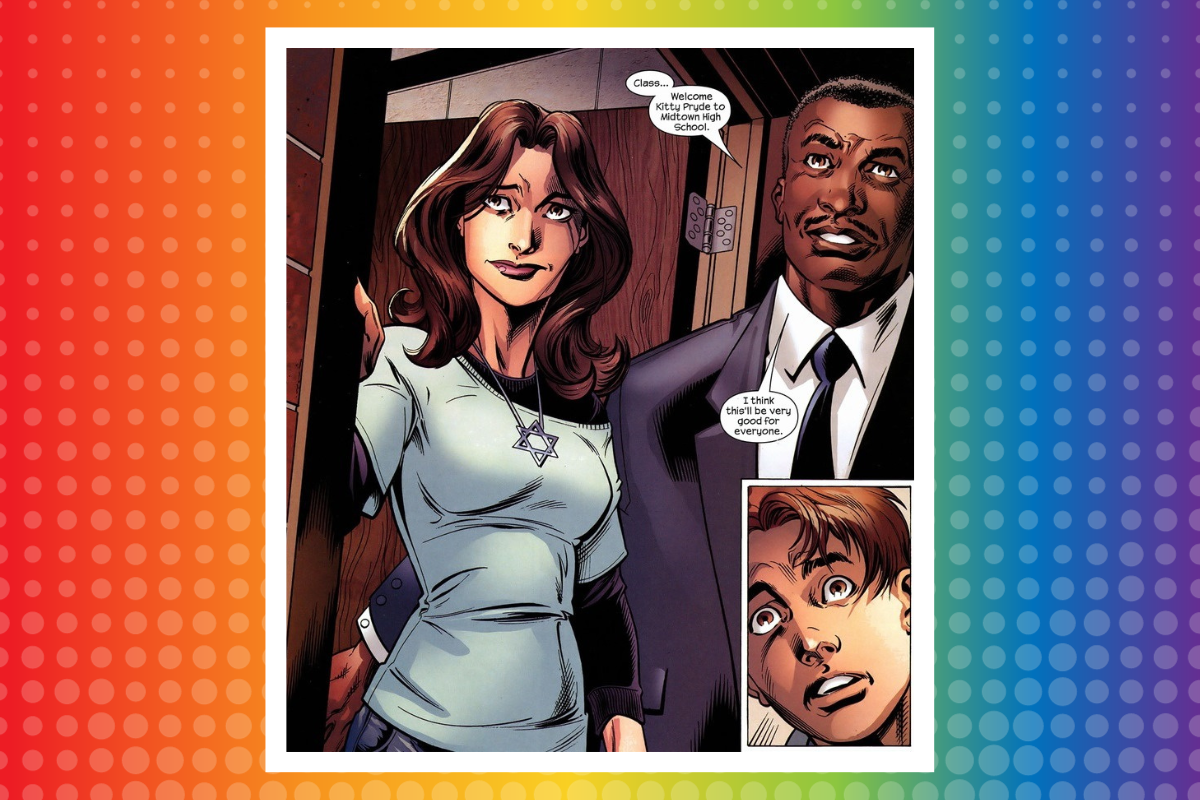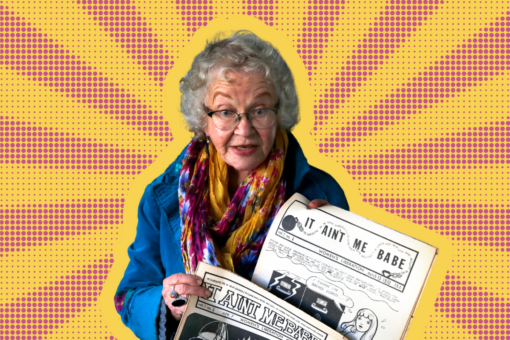In January 1980, a new character debuted in “Uncanny X-Men” #129. She was 13 years old and showed up rocking curly hair, a Star of David, and the power to walk through walls. Her name is Kitty Pryde, and since her creation by Chris Claremont and John Byrne, she’s been one of Marvel’s most prominently Jewish characters.
While it’s true that many early comics heavyweights such as Stan Lee were Jewish, most of their early creations could not be explicitly Jewish for fear of turning off a gentile audience. While there are good arguments to be made about the Jewish-coding of characters like Captain America, that’s still fan interpretation. The characters aren’t Jewish in-text.
But in 1980, the comic book landscape had changed enough that Claremont (who is himself Jewish) felt confident introducing a Jewish heroine. There is some debate over who Marvel’s first Jewish superhero is, and there isn’t a clear answer. But Kitty Pryde was definitely one of the first.
Kitty has been a popular character since her debut, at first acting as the teenage ‘kid sister’ figure to the older X-Men. Kitty’s journey from an impulsive and hot-headed kid to a level- headed adult capable of leading the X-Men, as she does in Joss Whedon’s “Astonishing X-Men,” is a showcase in impressive character development and growth. Kitty’s mutant power is referred to as the ability to “phase” in order to pass her body through solid objects such as walls. Kitty is also incredibly smart: She goes on to get a PhD in astrophysics at the University of Chicago.
Kitty has appeared in some non-comic properties — she appears in the animated shows “X-Men: Evolution” and “Wolverine and the X-Men,” and as a playable character in some Marvel video games. She has also appeared in live-action, played by Elliot Page (minus the Star of David necklace). The comic that “X-Men: Days of Future Past” was based on had Kitty as the main character, but in the movie Wolverine takes on her role, leaving her as a background character.
A distrust towards the MCU’s live-action depiction of Jewish characters, I would argue, is not entirely unwarranted. When Marvel introduced Wanda and Pietro Maximoff (Scarlet Witch and Quicksilver) in “Avengers: Age of Ultron,” they erased the twins’ Jewish-Roma heritage by changing their backstory, making them orphans from a fictional country and members of Nazi organization Hydra, before they got an eventual redemption. In the comics Wanda and Pietro do start as villains, but in Magneto‘s mutant extremist group rather than a Nazi organization, which is a pretty big difference.
Marvel films (and X-Men films, which until recently were owned by Fox, not Marvel Studios) don’t have a great history with Jewish characters. In fact, the only explicitly Jewish superhero in the Marvel Cinematic Universe is Moon Knight, based on one scene where he wears a kippah. And don’t get me wrong, I was super excited for that scene. But it’s almost 2024, and I think there’s nothing wrong with wishing for a little more. As “The Marvels”’ end credits scene showed by introducing X-Men character Beast, they’re gearing up to re-introduce the X-Men. A Kitty Pryde movie would be the perfect way to do so.
Kitty has been subtextually coded as queer since her early days. While she’s had male love interests, she’s also had close and emotional relationships with a lot of female characters, perhaps most notably with Illyana Rasputin (aka Magik). Illyana and Kitty are described as soulmates multiple times throughout Claremont’s run, with Kitty being the only other person capable of summoning Illyana’s magical sword. There’s also Rachel Summers, who Claremont explicitly intended to be Kitty’s true love. In 2020, issue #12 of the “Marauders” series brought subtext into text by having Kitty kiss a female tattoo artist. Since then, Kitty’s come out as bisexual, just as her creator had always planned.
Some themes that often recur in Kitty’s stories are questions of choice: Does she hide her mutant abilities, or does she display them? Kitty benefits from having a non-visible mutation — unlike Beast, for instance, she doesn’t have blue fur. I would argue that this also applies to her as a white person who can pass as non-Jewish: Does she hide her religion, or display it proudly? In issue #13 of “All New X-Men,” Kitty recounts a story that answers these questions quite clearly: She experienced a childhood crush making antisemitic comments, not aware that Kitty was Jewish. Kitty proudly relates her Jewishness with her mutant identity: “I am Jewish. I am a mutant. And I want people to know who and what I am,” she says. And a parallel to her queerness can also be drawn here: Kitty may not “look queer” but I’m sure if that issue was written after her 2020 coming-out, she would have named her queer identity as another piece of herself that makes her proud.
Kitty Pryde is an incredibly important Jewish character. Unlike Magneto or Moon Knight, who are groundbreaking in their own right, Kitty is not cynical. She’s optimistic about her future, and the future of her people, even though she’s seen the darker side of humanity. Hopeful, inspiring characters like Kitty are just as — if not more! — important to see in comics today than her more cynical and pessimistic counterparts, especially when it gives us a chance to see the characters from each side of the spectrum interact. Kitty and Magneto have some of the most interesting and nuanced interactions in the entire X-Men canon; his decision to become a hero and repent for his actions comes after accidentally harming Kitty during a fight. They later visit a Holocaust memorial together, and Magneto affectionately refers to the young Kitty as “tzatzkeleh,” a Yiddish word meaning “kitten.” It’s so powerful to see a character whose Judaism is an intrinsic part of her identity, and not just a vehicle for trauma. Kitty’s strength, courage, and determination to believe in and work for a better future for everyone are core Jewish values, and it’s meaningful to see them highlighted in comics.
The MCU is at a turning point. With more and more articles coming out about “Marvel fatigue” and audiences looking for something new coinciding with Marvel Studios’ re-acquisition of their X-Men properties, and with the extreme success of movies starring female superheroes, a movie led by a female Jewish superhero doesn’t seem as impossible as it once did. Kitty Pryde is the queer Jewish superhero lead we’ve been waiting for.
Your move, Marvel.



